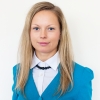What is Kickcity?
About three years ago I worked at a hotel, where tourists always asked me to recommend where to go out. This question was asked not only by people from different countries, but from inhabitants of St. Petersburg. I surfed the internet, but, in fact, I couldn’t predict whether my advice was useful or not. Then I came up with an idea that the city is full of interesting events, but there is no a website or other data source, on which people could read an event guide and learn about other potential visitors.
That is how Kickcity started. My partner and I ordered a marketing survey to understand what event guides exist in Russia and the USA. Then we started to make a design and back-end.
There were many people then and there are lots of them now who want to develop projects related to events. However I think that the right approach is necessary. The current ways of spreading information differ from previous ones — five years ago people bought tickets in booking offices, now everyone uses online bookings. Today one can use KudaGo to decide what to do for fun.

Most of such services are just information platforms on which one can read about events and make a decision. They don’t take into account two things. First of all, people want to find something in a certain location and do that very fast, as they are looking on the same day they want to go somewhere. Secondly, humans are social animals. Before visiting an event they want to know who else plans to visit it and talk to them.
Each social network has its purposes. We watch videos and share photos via Snapchat and Instagram, chat with each other using Telegram and WhatsApp. There is no service for events only, however Facebook has started an event platform.
Our service helps people who are interested in certain events to meet each other and organize their own events. For instance, using Kickcity I don’t need to use the assistance of promoters and agencies to organize an event.
What about such platforms as TimePad and Couchsurfing? They also have apps for organizing events.
TimePad is not a social network. They aim at earning money as opposed to giving users fun. That is why they have no special functions such as user accounts and online chats. One scarcely finds information about parties because TimePad aims to sell tickets. There is Ticketmaster — the largest ticket outlet in the world, but it is not popular in Russia. Here people use Kassir.ru for these purposes.
I wanted to create something like Ticketmaster with a communication option. We also plan to make it possible to book tickets through the app.
Couchsurfing has a wonderful app, but it aims at different things. For organizing events it has the "Hangouts" function (we also have it), however you can only invite friends to go for a walk or have a coffee. Can you make a profit from this? The answer is "no." That why Foursquare, which previously was very popular, failed. Using Kickcity, Basta [famous rapper from Russia -Ed.] may use his account to invite everybody to his concert.

Can Kickcity analyze users' preferences and give them advice based on them?
It is very simple to use: you need to choose a city and types of events. It is also possible to ignore filters to see all the events. In future we plan to use neural networks to teach the app to recommend. I know that plenty of ITMO’s developers are wonderful. I would be grateful if somebody gets interested in Kickcity and contacts us.
Do users add events by themselves or it is an automated process?
Our goal was to make it user-friendly, so users can easily create pages with events. These days we are negotiating with promotion platforms — so in future automated processes will not be a problem.

How did you find money for Kickcity? Did you use crowdfunding?
Crowdfunding doesn’t work in Russia. Only projects dealing with gadgets are likely to get support. We didn’t use crowdfunding, also l don’t believe in pitch sessions. All the money we received came from the government and investors.
During the first two years nobody knew about us. Everything changed when we visited the TURN8 accelerator. There we met with Elena Gavrilova [head of ITMO’s business incubator -Ed.] and Ekaterina Egoshina. Then we joined the IdealMachine accelerator, also visited Microsoft Flux and Slush conference where we won a grant from the Finnish government. Currently two Finnish accelerators are helping us establish an office in Helsinki. We are also launching the service in Israel, as it is very popular there.
ITMO University played an important role in Kickcity’s development. Today we have a large team. All our Android developers, Daniil, Vlad and Leonid, are ITMO’s students.
What advice can you give young startupers?
Trust your gut. Sometimes I hesitated as to whether an idea will become successful or fail. But I always realize in the end that even if I fail, I’m not going to die. When I started, I lost a lot of money. Sometimes developers deceived me. Someone else in my place would’ve stop doing it. But I knew what I wanted to achieve and continued. Follow your dream despite the problems.






